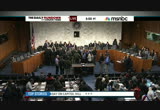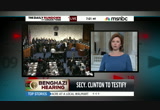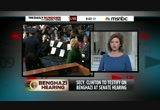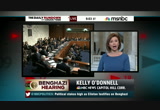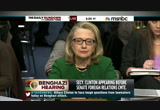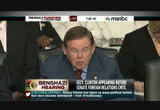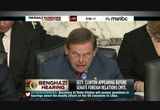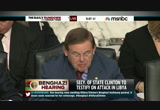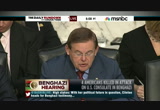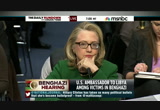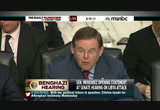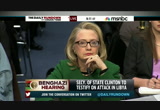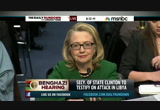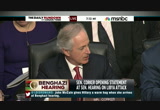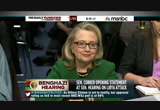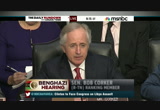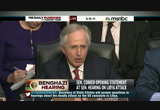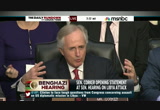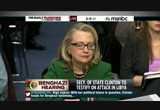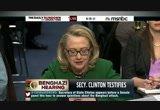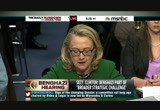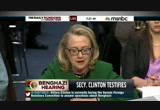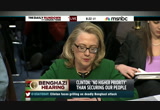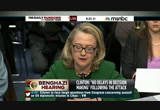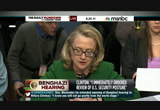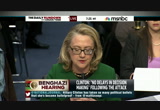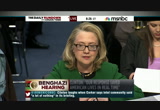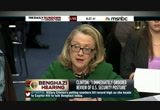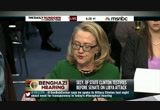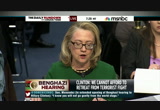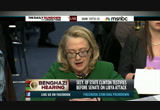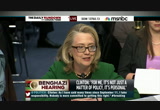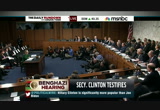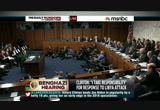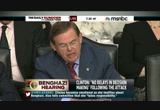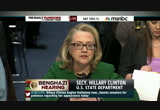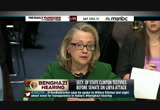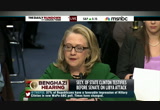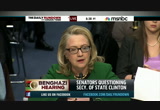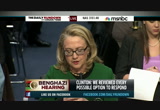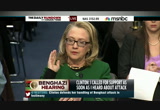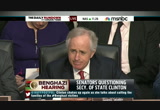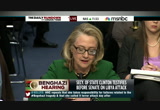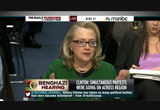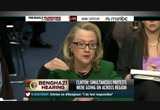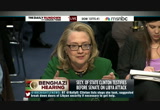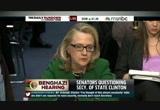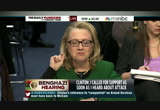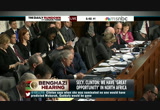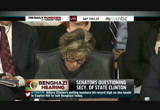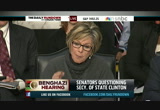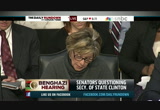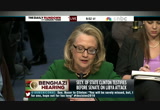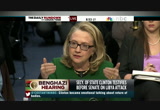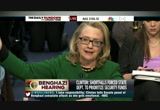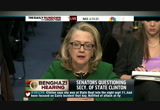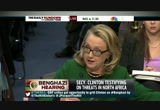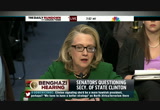tv The Daily Rundown MSNBC January 23, 2013 6:00am-7:00am PST
6:00 am
ersevered, supporting some of the biggest ideas in modern history. so why should our anniversary matter to you? because for 200 years, we've been helping ideas move from ambition to achievement. and the next great idea could be yours. ♪ [ male announcer ] how do you make 70,000 trades a second... ♪ reach one customer at a time? ♪ or help doctors turn billions of bytes of shared information... ♪ into a fifth anniversary of remission? ♪ whatever your business challenge, dell has the technology and services to help you solve it.
6:01 am
finally, time to talk about what we learned today. michael steele, what did you learn today? >> you lip sync pretty well. >> and i did the whole -- for dramatic effect. why be real if you don't have to be. i don't get it. that does it for us today. thanks for joining us this morning. straight ahead, live coverage of secretary of state clinton's testimony on benghazi. chris matthews is in for chuck. and the senate foreign relations committee will hear testimony this morning from secretary of state hillary clinton on the september 11th attack in benghazi, libya, that killed u.s. ambassador chris stevens and three other americans. good morning, i'm chris matthews, with you for the hour, as we watch secretary clinton's testimony, in what will likely be her final appearance on capitol hill, as the nation's top diplomat. secretary clinton will face questions that republicans have
6:02 am
wanted to ask for months. what exactly did she know about security failures in benghazi? well, nbc's kelly o'donnell is live on capitol hill. kelly, this is going to be one dramatic day up there. >> reporter: there has been so much buildup towards this. and because of not only the scope and the tragedy of what happened in benghazi, but the magnitude of who the prime witness is. hillary clinton, in one of her final acts as secretary of state, one of the things members have told me they really wanted to be certain about, was that she would testify while still secretary of state. as we all know, she suffered an illness, first there was a virus, a fall that led to a concussion, then a blood clot. had a really tough go. so there were questions about when she would be able to testify and even for a brief time, there were questions about whether or not her illness was serious enough. that's all been put to rest. what i hear from members is that the tone today will be a lot about looking to what can be done in the future, about protecting some of the sensitive areas that the u.s. has a presence around the world, but
6:03 am
also that critical question that you mentioned, about what did she know? we all know now that ambassador chris stevens had sent cables indicating that he had asked for more security, even on the day of his own death. and so there will be questions about what senator clinton knew, did people at a mid-level, a couple of whom have stepped down from their positions as a result of this, did the word get to her. did she have any hand in the decision making about resources that were there for the u.s. mission in benghazi, and there will be an important thing to note today, because the chairman of this committee is john kerry, the expected successor to hillary clinton. i'm told, do not expect to see kerry even in the room today. he is recusing himself, so today's committee will be chaired by the next most senior democrat, and that is bob me n menendez of new jersey. barbara boxer also has seniority in this committee, but she is the chair of another committee, so the way the rules will work, it will be bob menendez of new jersey who will be chairing
6:04 am
this. interesting to watch, a couple of the senators who might be in a 2016 frame of mind, marco rubio, rand paul, perhaps, they also did not serve with hillary clinton as a senator. so the tone might be different there. there's a lot of respect on both sides of the aisle from those senators who did know her personally, while she was a member of the u.s. senate. chris? >> well, you've set it up pretty well there, it seems, because you've got a very formidable political presence there. hillary clinton, we just looked at the new numbers on her, she's three to one popular. do you think that will make the republican critics a bit hesitant today? >> i think there is a sense of wanting to tread carefully with respect to secretary clinton. if it were a different head of a department, you might see a much tougher go. later this afternoon on the house side, there might not be quite that sense of decorum, if you will. but certainly, she is a prominent figure. we all saw what the problems with being the sort of
6:05 am
invincible front-runner were in 2008, so maybe those poll numbers aren't all that helpful. but this will be a key, key thing to watch today. chris? >> we'll be back to you, kelly o'donnell, on the hill. here's bob menendez of new jersey, who's chairing the hearing. >> -- of course, you had a bit of an intervening challenge and we're thrilled to see you hear today, doing well. and to take time out of your schedule in these final days to discuss the tragic events that occurred in benghazi on september 11th, and the lessons we need to learn from that event, to ensure that all american personnel are fully protected, and our embassies are fully secure wherever they are. in your tenure of secretary of state and your appearances before this committee, you have always been up-front, forthright, and energetic in defending our foreign service officers and their needs and i, for one, commend you for it. unfortunately, the tragic events in benghazi are a sad reminder
6:06 am
of the inherent risks that come with diplomatic engagement in parts of the world that are struggling to build new governments from what has often been a chaotic situation and underscore the very real courage of the unsung men and women who put their lives at risk to serve this nation's interests in those areas. let me say i respect what you have done during your tenure as secretary of state in representing not only this nation, but all of those in our foreign service, who are on the diplomatic front line in turbulent and dangerous parts of the globe. it's a reflection of your leadership, as well as your patriotism and your abiding belief in the power of our policies to move the world towards democracy, peace, and preservation of human rights. your candor before this committee has been a trademark of your service as secretary of state, and i believe that every member has always welcomed your openness and your cooperation. your letter of december 18th to chairman kerry was appreciated by members of both sides, as another example of that openness
6:07 am
and cooperation. let me say, we share your mission here today, and that we look forward to a constructive dialogue today, to learn from the events that occurred in benghazi, and to devise policies to better protect, the nearly 70,000 men and women serving in d.c. and in more than 275 posts around the world. ambassador chris stevens, sean smith, tyrone woods, and glenn dougherty lost their lives on september 11th, 2012, during terrorist attacks on the special mission benghazi. as a committee, we honor their service to our nation and we grieve for their families, but we also resolve to take specific actions to prevent future incidents. we may not be able to prevent every single terror attack in the future, but we can and we must make sure that our embassies and employees, starting with high-risk, high-threat posts are capable of withstanding such an attack. to that end, secretary clinton
6:08 am
and the department have embraced and agreed to embrace all 29 of the administrative review board's recommendations, and today we'll hear more about the progress the department has already made towards implementation of many of the recommendations. but i would add that congress is not without responsibility here. we also have an obligation to do our part to comply with the administrative review board's recommendations. it is my intention to work with the members of the committee and the department in the coming months on legislation that will improve security and better protect our employees. one of the first and easiest things that we can do is to ensure that the department's contracting rules allow for sufficient flexibility, to allow them to quickly make decisions where security is at risk, and to hire local guards, not only on the basis of the lowest price technically acceptable, but on a best value basis, to ensure that we are not just checking the box when it comes to securing our building and protecting our people. the state has this authority through march for afghanistan,
6:09 am
pakistan, and iraq, but value should be a priority in all locations, and particularly in high-risk environments. we're also looking at where soul source contracting may be appropriate, to respond for certain security-related contacts. the administrative review board also supports expanding the marine security guard program, hiring and equipping more diplomatic security personnel, and of critical importance, authorizing full funding for the capital cost sharing program. the capital cost sharing program for embassy construction was created in the aftermath of the 1998 bombings of the u.s. embassies in nairobi that resulted in 224 deaths, including 11 american citizens. in its first year, it funded the construction of 13 new facilities, followed by 11 in 2006, 9 in 2005. nearly every year since, fewer facilities have been built than in the previous year, due to both funding decreases and the fact that the allocations to the account have never been indexed
6:10 am
to inflation. costs in the construction industry worldwide have risen tremendously. at the current anticipated funding rate for fy 2013, the department estimates it will be able to construct just three new facilities, despite the fact that there are a couple of dozen posts that have now been designated as high-risk, high-threat posts that need replacing right now. but the lessons of benghazi aren't only about adequately resourcing our security operations. this is also about the flow of information between the department and our foreign facilities. within the department itself, among all the agencies engaged in international work, and between the department and congress. the department should be assessing and regularly designating which posts it considers to be high-threat and high risk. using that information to drive decisions about security, and reporting to congress on security conditions at these posts. the administrative review board also makes clear that there were failures in benghazi that resulted in an inadequate
6:11 am
security posture, and that responsibility for these failures was shared by washington, by the u.s. embassy in tripoli, and by the inexact and nonstatus designation of the special mission. this left unclear what the security requirements of the mission were or should be, and left staff in the field with limited ability and resources to fix the situation. clearly, that needs to change. there are two other crucial points made by the administrative review board that i think deserve attention on a larger scale by members of this committee. first, the art placed emphasis on the growing challenge of all military officials overseas of how to remain active in environments, how to get out to conduct the direct local interaction required for effective diplomacy. how do we remain accessible to foreign government's civil societies in the private sector while still securing our embassies and protecting our people in these environments? second, the administrative review board correctly points
6:12 am
out that the department has been resource challenged for many years, and this has constrained our mission and led to the husbanding of resources to such a degree that restricting the use of resources, even for security, has become a conditioned response. this is to say that decisions about security resources being made more on costs than on need and value. and the answer can't be to cut more from other foreign affairs accounts to fund security. that approach fails to recognize that diplomacy and foreign aid are but down payments that yield dividends to us in terms of goodwill, open borders for the export of american products, protection of our intellectual property, and most importantly, cooperation on security and counterterrorism. so, there's a lot to discuss. and madame secretary, welcome again. we very much appreciate your time. on a person note, since this is likely to be your last hearing before this committee, and your leadership will be missed, i know i speak for many when you say that you've been an
6:13 am
outstanding secretary of state, an exemplary representative of american foreign policy and american values and interest to every leader around the world. you have changed the face of america abroad and extended the hospitable reach of our nation to ordinary citizens, in addition to world leaders. during your tenure, you have steered us through economic crisis in europe, changing relations with asia, regime change in the arab world, a momentous transition in libya, and a trend towards global strength based on economics rather than arms. in addition to these priorities, on nearly every trip of which you are the most traveled secretary in history, you also supported, met, and provided a voice to those individuals that don't live in the limelight. women, children, the lbgt community, made a real personal difference in the live of so many people, and for that you have the thanks of a grateful
6:14 am
nation. i know you will not go gently from the world stage and i look forward to working closely to you in the future. we thank you for your service here in the senate and as secretary of state. we welcome you back any time to talk about the issues of the day, recognizing that you may not care to spend anymore time in that chair than you already have, but we certainly appreciate your incredible service. with that, let me turn to my friend and colleague, the new ranking member of the committee, senator corcoran. >> thank you, mr. chairman. and thank you for your comments. and also for following through, as we've all discussed, to have this hearing today. i want to welcome the new committee members. and i know there'll be a time for us to talk a little bit about the committee going forward. in many ways, this is closing out business from before, but i thank you very much for having this hearing and look forward to working with everybody on the committee. madame secretary, i want to thank you also.
6:15 am
i know we've had a number of conversations over the last several weeks and actually over the last four years, and i want to thank you for coming in today and honoring the commitment that you made some time ago. i know you've had some health issues, still undergoing, and yet you're here today, and i think we all do respect the tremendous amount of hard work that you've put forth over the last tour years. you probably traveled more than any secretary of state in history and came at your job in the way we all thought you would, with hard work and diligence, and i know all of us appreciate the transparency with which you talk to all of us and candid lly from time to time, which is much appreciated. i do want to say that benghazi, i think to all of us, represents a lot of different things. in some ways, the aftermath, in particular, of what we saw represents the very worst of
6:16 am
washington, and the most bizarre briefing, i think, i ever attended was a briefing we had on september 20th, where the intelligence community said more than nothing, and it was a bizarre briefing, at best. it happened in the middle of a political campaign, and obviously, there was a lot of spin from the white house and a lot of comments made on both sides of the aisle, which heightened a lot of the focus on benghazi. i think it also represented a department that in many ways made decisions that weren't best for those in the field. i think it represented, in many ways, the denial of the world as it really is today. and i think after reading the arb, it also represented, to me, a committee that has never done its work, or at least, in the six years that i've been here, has never done the kind of oversight that this committee ought to do.
6:17 am
but i think it also represents an awakening. i know that you have known this, and i know, especially, many of the members on this committee have known this, but, the spiking of the ball and the thinking that when osama bin laden was gone, that was the end of al qaeda, we know nothing could be further from the truth. and the arab spring has actually ushered in a time where al qaeda is on the rise, the world, in many ways, is even more dangerous, as we lack a central command, and instead have these nodes that are scattered throughout north africa and other places. and i think this creates an opportunity for us to develop a policy that really addresses the world as it really is today. and then, thirdly, madam secretary, i know that it was a great personal loss to you that chris stevens died in the way that he did and his three colleagues died in the way that they did. i know that you know i was on the ground in the libya,
6:18 am
immediately after this, and i know you've experienced this and some of the other members of the committee have, but to look at the faces of those on the ground in libya, in a state of shock. people that we sent there, doing expeditionary diplomacy, who felt like they were on a tether and candidly not have the support from washington that they needed to do the things that they needed to do. so i think this is an opportunity for us to examine the systemic failures. i know that you're going to be, as per our conversation last night, as transparent as you have always been. i think this is a great opportunity for the incoming secretary to learn from what has happened. and i know that many times, political appointees have great difficulties with the bureaucracy that exists within a department, where sometimes people feel they can wait you out, until the next american comes along. so i think this is an opportunity for us to look at
6:19 am
those failures. i think it's an opportunity for us, also, as a committee, but also as a country, to develop a foreign policy that reflects, again, the dynamics of the region, as they really are today. lastly, i think this is an opportunity for this committee to finally do the work that are it should have been doing for years. when you read the arb report and you realize that we have never done an authorization of the state department in the six years that i've been here, we've never looked at how foreign aid has been spent. we've never done a top to bottom review. i know that is something that people like you, who come to this position, look at as something that is healthy and can be done in partnership. i know there was some mention of cost, and i was really disappointed with the arb when the first thing that came out of the mouths of two people that i
6:20 am
respect was money, money, money. the fact is, this committee would have no idea whether the appropriate amount of money is being spent, or if that could have prevented what happened in benghazi, because we've never done an authorization. soy look at this as a tremendous opportunity, and i want to close again by thanking you for your service, thanking you for your friendship, thanking you for your transparency, and i certainly look forward to your testimony. and i know it will be presented in a way that will be constructive and helpful to us in the future. thank you. >> thank you, senator corker. with that, madame secretary, i welcome your remarks. >> thank you very much, mr. chairman, ranking member, members of the committee, both older and new, i'm very grateful for this opportunity and i thank you very much for your patience to give me the chance to come and address these issues with you. as both the chairperson and the ranking member have said, the
6:21 am
terrorist attacks in benghazi on september 11th, 2012, that claimed the lives of four brave americans, chris stevens, sean smith, tyrone woods, and glen dougherty, are part of a broader strategic challenge to the united states and our partners in north africa. today i want briefly to offer some context for this challenge, share what we've learned, how we are protecting our people, and where we can work together to not only honor our fallen colleagues, but continue to champion america's interests and values. any clear-eyed examination of this matter must begin with this sobering fact. since 1988, there have been 19 accountability review boards investigating attacks on american diplomats and their facilities. benghazi joins a long list of tragedies for our department, for other agencies, and for america. hostages taken in tehran in 1979, our embassy and marine
6:22 am
barracks bombed in beirut in the 1983, saudi arabia in the 1996, our embassies in east africa, 1998, consulate staff murdered in jetta in 2004, the coast attack in 2009, and too many others. since 1977, 65 american diplomatic personnel have been killed by terrorists. now, of course, the list of attacks foiled, crises averted, and lives saved is even longer. we should never forget that our security professionals get it right more than 99% of the time against difficult odds all over the world. that's why, like my predecessors, i literally trust them with my life. let's also remember that administrations of both parties in partnership with congress have made concerted and good faith efforts to learn from these attacks and deaths, to
6:23 am
implement recommendations from the review boards to seek the necessary resources and to do better in protecting our people from what has become constantly evolving threats. that is the least that the men and women who serve our country deserve. it's what again we are doing with your help. as secretary, i have no higher priority and no greater responsibility. as i have said many times, i take responsibility and nobody is more committed to getting this right. i am determined to leave the state department and our country saf safer, stronger, and more secure. now, taking responsibility meant moving quickly in those first uncertain hours and days to respond to the immediate crisis, but also to further protect our people and posts in high-threat areas across the region and the world. it meant launching an independent investigation to determine exactly what happened in benghazi and to recommend
6:24 am
steps steps for improvement and it meant intensifying our efforts to combat terrorism and figure out effective ways to support the emerging democracies in north africa and beyond. let me share some of the lessons we've learned, the steps we've taken, and the work we continue to do. first, let's start on the night of september 11th itself and those difficult early days. i directed our response from the state department, stayed in close contact with officials from across our government and the libyan government, so i saw firsthand what ambassador pickering and former chairman mullen called timely and exceptional coordination. no delays in decision making, no denials of support from washington or from our military, and i want to echo the review board's praise for the valor and courage of our people on the ground, especially the security professionals in benghazi and tripoli. the board said the response saved american lives in realtime, and it did. the very next morning, i told
6:25 am
the american people that heavily armed militants assaulted our compound. and i vowed to bring them to justice. and i stood with president obama in the rose garden, as he spoke of an act of terror. it's also important to recall that in that same period, we were seeing violent attacks on our embassies in cairo, sanaa, tunis, khartoum, as well as large protests outside many other posts where thousands of our diplomats served. so i immediately ordered a review of our security posture around the world, with particular scrutiny for high-threat posts. i asked the department of defense to join interagency security assessment teams and to dispatch hundreds of additional marine security guards. i named the first deputy assistant secretary of state for high-threat posts, so missions in dangerous places get the attention they need. and we reached out to congress to help address physical
6:26 am
vulnerabilities, including risk from fire, and to hire additional diplomatic security personnel. second, even as we took these steps, i hurried to appoint the accountability review board, led by ambassador pickering and admiral mullen, so we could more fully understand, from objective, independent examination, what went wrong and how to fix it. i have accepted every one of their recommendations, i asked the deputy secretary from management and resources to lead a task force to ensure that all 29 of them are implemented quickly and completely, as well as pursuing additional steps above and beyond the recommendations. i also pledged in my letter to you last month that implementation would begin and it has. our task force started by translating the recommendations into 64 specific action items. they were assigned to bureaus and offices with clear timelines for completion. 85% are now on track to be
6:27 am
completed by the end of march. a number are already completed. and we will use this opportunity to take a top-to-bottom look, and rethink how we make decisions on where, when, and whether people operate in high-threat areas and then how we respond to threats and crises. we are initiating an annual high-threat post review, chaired by the secretary of state. and ongoing reviews by the accident secretaries to ensure that pivotal questions about security do reach the highest levels. we will regularize protocols for sharing information with congress. these are designed to increase the safety of our diplomats and development experts, and a reduce the chances of another benghazi happening again. we've also been moving forward on a third front, addressing the broader strategic challenge in north africa and the wider region. because, after all, benghazi did not happen in a vacuum. the arab revolutions have
6:28 am
scrambled power dynamics and shattered security forces across the reign. instability in mali has created an expanding safe haven for terrorists, who look to extend their influence and plot further attacks of the kind we saw just last week in algeria. and let me offer our deepest condolences to the families of the americans and all the people, from many nations, who were killed and injured in that recent hostage crisis. we are in close touch with the government of algeria. we stand ready to provide assistance. we are seeking to gain a fuller understanding of what took place, so we can work together with algerians and others to prevent such terrorist attacks in the future. concerns about terrorism and instability in north africa are, of course, not new. they have been a top priority for the entire administration's national security team. but we have been facing a rapidly changing threat
6:29 am
environment, and we have had to keep working at ways to increase pressure on al qaeda and the islamic maghreb and the other terrorist groups in the region. in the first hours and days, i conferred with leaders, the president of libya, foreign ministers of tunisia and morocco, and then i had a series of meetings at the united nations' general assembly, where there was a special meeting focused on mali and the sahel. in october, i flew to algeria to discuss the fight against aqim. in november, i spent deputy secretary bill burns to follow up in algiers, and then in december, in my instestead, he co-chaired an organization we started to respond to some of these threats, the global counterterrorism forum, that was meeting in abu dhabi, as well as a meeting in tunis of leaders working to reform security services. we have focused on targeting al qaeda's syndicate of terror, closing safe havens, cutting off
6:30 am
finances, countering extremist ideology, slowing the flow of new recruits. and we continue to hunt the terrorists responsible for the attacks in benghazi and are determined to bring them to justice. we are using our diplomatic and economic tools to support these emerging democracies and to strengthen security forces and help provide a path away from extremism. but let me underscore the importance of the united states continuing to lead in the middle east, in north africa, and around the world. we've come a long way in the past four years, and we cannot afford to retreat now. when america is absent, especially from unstable environments, there are consequences. extremism takes root, our interests suffer, our security at home is threatened. that's why i sent chris stevens to benghazi in the first place. nobody knew the dangers better than chris. first, during the revolution,
6:31 am
then during the transition. a weak libyan government, marauding militias, terrorist groups, a bomb exploded in the parking lot of his hotel, but he did not waiver, because he understood it was critical for america to be represented there at that time. our men and women, who serve overseas, understand that we accept a level of risk to protect the country we love. and they represent the best traditions of a bold and generous nation. they cannot work in bunkers and do their jobs. so it is our responsibility to make sure they have the resources they need and to do everything we can to reduce the risks. for me, this is not just a matter of policy, it's personal. i stood next to president obama as the marines carried those flag-draped caskets off the plane at andrews. i put my arms around the mothers
6:32 am
and fathers, the sisters and brothers, the sons and daughters, and the wives left alone to raise their children. it has been one of the great honors of my life to lead the men and women of the state department and usaid. more than 70,000 serving here in washington, more than 270 posts around the world. they get up and get to work every day, often in difficult and dangerous circumstances, because they believe, as we believe, the united states is the most extraordinary force for peace and progress the world has ever known. and when we suffer tragedies overseas, as we have, the number of americans applying to the foreign service actually increases. that tells us everything we need to know about what kind of patriots i'm talking about. they do ask what they can do for their country and america is
6:33 am
stronger for it. so today, after four years in this job, traveling nearly a million miles, visiting 112 countries, my faith in our country and our future is stronger than ever. every time that blue and white airplane carrying the word "united states of america" touches down in some far-off capital, i feel again the honor it is to represent the world's indispensable nation, and i am confident that with your help, we will keep the united states safe, strong, and exceptional. so i want to thank this committee for your partnership and your support of diplomats and development experts. you know the importance of the work they do, day in and day out. you know that america's values and vital national security interests are at stake. and i appreciate what ranking member corker just said. it is absolutely critical that this committee and the state
6:34 am
department, with your new secretary and former chairman, work together to really understand and address the resources, support, and changes that are needed to face what are increasingly complex threats. i know you share my sense of responsibility and urgency, and while we may not agree on everything, let's stay focused on what really matters, protecting our people and the country we love. and thank you for the support you personally have given to me over the last four years. i now would be happy to take your questions. >> thank you, madame secretary. >> there you have it, hillary clinton's opening statement. let's go to our guest, steve clements, editor at large for the atlantic. he also is with the new america foundation. michael singh is the director of the america institute for near-east policy. steve, what was the most important thing you heard from the secretary? >> no denial of support and in delay in decision making. she just put it out there
6:35 am
blunting and it's now going to be up to the members of that committee to say, they've either got evidence that she's lying or not or there's just nothing there that you can draw from her. she said, we didn't deny and we gave them what they needed. >> michael? >> chris, i think it's not the small tactical stuff, which has been gone over many times now. it's the bigger strategic issues. it's her statement that we can't conduct diplomacy from a bunker pb and it's also this broader strategic challenge in north africa that she's referring to, and we've seen that play out in algeria as well. >> thank you, gentleman. back to the chairman, bob menendez of new jersey. >> -- despite a higher price tag, because it was more secure than returning to the hotel where there had been a bomb and bomb threats, or moving closer to the annex, because it was closer to the road. can you give us your insights on the decision making process regarding the location of the mission? and as part of that, can you also in your response, you touched upon it in your opening
6:36 am
statement, but what actions were you and your staff taking the night of september 11th and into september the 12th? >> well, first, you're right, mr. chairman, that there was an ongoing discussion. when chris first landed in benghazi, he stayed in a hotel lang with other representatives of different nations. there were attacks in the vicinity, including in the parking lot of the hotel. the decision was made to move. the compound was selected as being a much better location in terms of security than the alternatives, but there was an ongoing discussion between chris and others in the embassy in tripoli, those going in and out of benghazi, about how best to situate our post there. i did see some overnight reporting about a document i'm not sure what it is, but i would observe that there were a lot of
6:37 am
ongoing efforts because, it was important that we were constantly asking what was the best place. as you said, in general, chris was committed to not only being in benghazi, but to the location. the professionals in washington paid close attention to chris' judgment based on his experience and his firsthand knowledge, and so we stayed, we continued to try to upgrade the facility that was attacked. obviously, as the arb has pointed out, there were inadequacies in the response, and those are the specific kind of recommendations that we are currently implementing. regarding what i was doing on september 11th, i was at the state department all day and
6:38 am
late into the night. during most of the day, prior to getting notice of the attack on our compound at benghazi, we were very focused on our embassy in cairo. that was under assault by a group of protesters. we were assessing the security of our embassy, which is, as those of you have been there, certainly well defensed. but there were crowds that were intent upon trying to scale the wall and, we were in close communication with our team in cairo. i was notified of the attack shortly after 4:00 p.m. over the following hours, we were in continuous meetings and conversations, both within the department, with our team in tripoli, with the inner agency, and internationally. i instructed our senior department officials and our diplomatic security personnel to
6:39 am
consider every option, to just break down the doors of the libyan officials to get as much security support as we possibly could, to coordinate with them. i spoke to the national security adviser, tom donilon, several times. i briefed him on developments. i sought all possible support from the white house, which they quickly provided. tom was my first call. i spoke with our target in tripoli, to get situation updates. i spoke with former cia director petraeus to confer and coordinate, given the presence of his facility, which, of course, was not well known, but was something that we knew and wanted to make sure we were closely lashed up together. i talked with the then-libyan national congress president, to press him on greater support, not only in benghazi, but also in tripoli. i participated in a secure video
6:40 am
conference of senior officials from the intelligence community, the white house, and d.o.d. we were going over every possible option, reviewing all that was available to us. any actions we could take. we were reaching out to everyone we could find, to try to get an update about ambassador chris stevens, also, our information specialist, sean smith. so it was a constant, ongoing discussion and sets of meetings. i spoke with president obama later in the evening, to, you know, bring him up to date, to hear his perspective. obviously, we kept talking with everyone during the night, early in the morning, on the 12th. i spoke with general dempsey, again, with tom donlon. the two hardest calls that i made were obviously to the families of ambassador stevens
6:41 am
and sean smith. and, you know, they, i have to say, were extraordinary in their responses, in their understanding of the pride we had in both men, and gratitude we had for their service. i would also just quickly add, mr. chairman, that while this was going on, we were continuing to face protests, demonstrations, violence across the region and as far as india and indonesia. there were so many protests happening and thousands of people were putting our facilities at risk, so we were certainly very determined to do whatever we could about benghazi. we were relieved when we finally got the last of americans out of
6:42 am
benghazi, but then we were turning around, dealing with the very serious threats facing so many of our other facilities. . >> thank you very much. my time has expired. senator corker? >> thank you, mr. chairman. madame secretary, i agree with you, when people go into the field to do the things they do, they do it knowing of the risk. and i agree with you, one of the untold stories here is that the heroic nature of many in libya and what they did to save lives. i met several of the jsoc folks and others who risked their lives to save others. but also i know there were systemic sufficiencies, and i know you know that. and i would like you to just speak to that for a moment. to my knowledge, no one has been held accountable. and our staff had a meeting with one of the state department officials and i hate to use this word again, but it was nothing short of bizarre as they talked
6:43 am
about the communications. these officials were screaming out for more security. and i'm just wondering if you might mention one reform that would be helpful, so that you would have known of the needs there of security, that went undone. >> well, obviously, i have thought about this almost constantly since that date, senator, because, you know, i do feel responsible. i feel responsible for the nearly 70,000 people who work for the state department. i take it very seriously. the specific security requests pertaining to benghazi, you know, were handled by the security professionals in the department. i didn't see those requests. they didn't come to me. i didn't approve them, i didn't deny them. that's, obviously, one of the findings that ambassador pickering and admiral mullen made, you know, that these
6:44 am
requests don't come to the secretary of state. >> if we could, i respect you tremendously, but we have a short amount of time. they did come into folks. >> that's right. >> we did have people on the ground, at no cost to the state department. they were asked to be extended, by the ambassador. someone at state department turned that down. they were at no charge, 16 officers. so i just wonder, what has happened inside to make sure that never happens again? >> well, several things. not only are we on the path to implement all of the arb recommendations, but we've gone beyond that. we did immediately do this high-threat assessment, using d.o.d. assets as well as our own. that had never been done before. we have asked the congress to help us re-allocate funds. the senate has given us that authority. we don't yet have it from the house. so that we can get more marine guards, more diplomatic security guards, we can try to put more
6:45 am
money into the maintenance, the upgrades, the construction that's needed. i created the first ever, it sounds like it should have been done years ago, but the first ever deputy assistant secretary for high threats. i'm also recommending that there be a regular process that includes a secretary and the deputies in these decisions. because nobody wants to sit where i am. and, you know, have to think now about what could've, should've, would've happened in order to avoid this. now, as i said, we've had 19 arbs. only two have ever been unclassified. the one coming out of the east africa bombings, where there was full transparency, there was a set of recommendations, many of which have been implemented, along with recommendations from other arbs. but this committee never had a public hearing about the 17 other arbs, because they were classified. so, we're putting into action
6:46 am
steps that we think will help the next secretary be able to make these decisions, be part of these decisions, have more insight into what is going on, and we would, obviously, welcome the opportunity to work closely with a subcommittee or a set of members to make sure that that's what's happening. >> well, thank you. i will, just many, 19 or 17 have been done. i will say none of them have never been fully implemented. >> senator, that's not accurate. i heard you say that when bill burns and tom were here and it shocked me. so we went back, we did a full and thorough investigation. the vast majority have been implemented. and we will give you a report to that effect, because that's the kind of, to go back to your point, senator, if there were an authorization process, that's the kind of information that would be shared. and i see my former compatriot
6:47 am
on the armed services committee, there is always an armed services authorization, and there needs to always be a foreign relations committee authorization. >> it's my sense, my last question, it's my sense that as a nation, we were woefully unprepared for what happened in northern africa in general. i think you share that view, and i just wonder, i know you have made some opening comments regarding us leading in that area, but it seems to me that benghazi symbolizes just the woeful unpreparedness that our nation had as it relates to issues in north africa. and i hope you'll address that as you move ahead. >> well, senator let me just briefly address what i think is one of the key issues for this committee, for the administration, for our country. when i was here four years ago, testifying the for my
6:48 am
confirmation, i don't think anybody thought that mubarak would be gone, gadhafi would be gone, ben ali would be gone, that we would have such revolutionary change in this region. there were hints of it. several of us, you know, said the institutions were sinking in the sand, as i said in doha shortly before tahrir square. so there was some feeling out there, but i don't think any of us predicted this. least of all, the people in these country, who then were given a chance to chart their own futures. this is a great opportunity, as well as a serious threat to our country. i hope we seize the opportunity. it's not going to be easy, because these new countries have no experience with democracy. they don't have any real experience among the leaders in running countries, in doing security so, yes, we now face a
6:49 am
spreading jihadist threat. we have driven a lot of the aq operatives out of the fatah, out of afghanistan, pakistan, killed a lot of them, including, of course, bin laden. but, we have to recognize, this is a global movement. we can kill leaders, but until we help establish strong democratic institutions, until we do a better job communicating our values and building relationships, we're going to be faced with this level of instability. and i do have a lot of thoughts about what more we can and should do, given this new reality we face. >> thank you again. >> senator boxer? >> thank you very much. madame secretary, you have represented our country with tremendous strength and poise, you've won us friends, but you've always spoken out forcefully where required. i want to thank you, because this is maybe the last time you come before us as secretary
6:50 am
here. i want to thank you for your advocacy, on behalf of women around the globe. you will be sorely missed, but i, for one, hope not for too long. as you have said, you are heartbroken by those losses in benghazi. we saw it in your face many times, today as well. you were heartbroken, personally and professionally. but rather than pointing to others for their deficiencies, you stepped up and you convened an accountability review board to look into this attack in detail, and you asked them to tell it the way they saw it. and i want to give you my take on that board. i want to go to something senator corker said, which i agreed with. the first report we got from the intelligence community about a week or so after, was very
6:51 am
confusing, it was not helpful to us. all of us, i think, felt that way. but i want to speak for myself. the difference between that meeting and the meeting we had with those co-chairs, which was also a classified briefing, couldn't have been more different. they were so impressive and thorough and strong. they did call it the way they saw it, the way you wanted them to do. and i am grateful that you have unequivocally committed to ensuring that their recommendations are implemented to the fullest extent. and this brings me to a question. as we all know, the house of representatives urged and voted for a cut of $300 million for embassy security. now, maybe it's irrelevant for some here, but i have a message. it does cost money to pay for
6:52 am
embassy security or police on the beat or military personnel or police here at the capitol that protect us, which we're very grateful for and we pay for. it does cost money. so to me, i was not disappointed to hear the co-chair say, quote, congress must do its part to meet this challenge and provide necessary resources to the state department to address security risks and meet mission imperatives. i think it's a no brainer. and the fact we would even have a problem with it, to me, doesn't make any sense. i hope we can work together to get the resources that we need for security, which brings me to a question about working more closely with the dod. and here it is. have you already engaged with d.o.d. to provide additional marines at u.s. facilities to fulfill the arb's recommendation
6:53 am
that state and d.o.d. work together to provide more capabilities and capacities at higher risk posts? before you answer that, could you maybe address the issue in mali. you see a government that is weak, they don't have the best security. are we working on that post? >> well, senator, you've raised a lot of important issues. i'll try to be as quick as i can in responding to them. let me start with the budget. this is a bipartisan issue. since 2007 the department consistently requested greater funding for embassy construction and diplomatic security with the exception of 2010, congress has consistently enacted less than requested, most notably in 2012, received $340 million less than requested. close to 10% less than the request. and cuts to security and maintenance budgets were almost
6:54 am
10% off as well. now the arb as you said have recommends an increase in facilities funding to $2.2 billion per year to restore the construction levels called for in the 1998 arb report. the only other one that was public. i would go back to something the chairman said. consistent shortfalls have required the department to prioritize available funding out of security accounts. i will be the first to say that the prioritization process was imperfect but the funds provided were inaccurate. we need to work together to overcome that. we are asking for funding for more marine security guards for refilling the capital account so we can do the kind of upgrades and construction that's needed. deputy secretary briefed house and senate appropriations and authorizing staff.
6:55 am
we've sent letters to the house and senate leadership to ask for transfer authority language, not new money right now but transfer authority language. the senate was good enough to put it into the senate version of the sandy supplemental. it did not get into the house side. we're still looking for the house to act. with respect to mali, there was a country that had been making progress on its democracy and unfortunately it suffered a military coup by low ranking military officers, which threw it into a state of instability. with the tore regs, some groups as well as other groups had been in the employ of gadhafi for year and used them as mercenaries with his fall they came out of libya bringing huge amounts of weapons from the enormous stores of weapons that gadhafi had that insurgents
6:56 am
liberated as well as others. and they came into northern mali at the same time there was a move by al qaeda to establish a base in northern mali. we have been working to try to upgrade security around northern mali among a number of the countries, algeria is the only one with any real ability to do that. most of these countries do have the capacity to do that. we are now trying to help put together an african force so that african soldiers will be in the front of this fight. the malians asked the french to come in. france is one of our oldest allies. we are trying to provide support to them. but this is going to be a very serious ongoing threat because if you look at the size of northern mali and look at the topography, it's not only desert
6:57 am
but caves. sounds reminiscent. we are in for a struggle. it is a necessary struggle, we cannot permit northern mali to being a safe haven. aqm hasn't attacked the united states. before 9/11/2001, we hadn't been attacked on homeland since i guess the war of 1812 and pearl harbor. you can't say because they haven't done something they are not going to do it. this is not only a terrorisind indicate, i would hope we have no only a strategy that understands making it possible for these governments to defend themselves better for people to understand and agree with us that these terrorists are not in any way representative of their values, but that we can bolster democracy and try to give these
6:58 am
arab revolutions a real chance to succeed. >> thank you. >> madam secretary, thank you for your service and thank you for the kindness you've shown this committee over the time you've been there, particularly appreciate your facilitating the meetings with us at the state department with yourself when we've had issued. moving to the issues at happened, this morning the national media is reporting that some of the -- a number of the attackers in algeria are people who participated in the attack in benghazi. can you confirm that for us this morning? >> senator, i cannot confirm it. i can give you the background that i was able to obtain. this information is coming from the algerian government related to their questioning of certain of the terrorists that they took alive. we don't have any way to confirm it as yet. but i can certainly assure you we will do everything we can to
6:59 am
determine that. you may know that director muler was just in the region meeting with leaders. he's well aware we have to track every one of these connections. and this will be a new thread that will be followed. >> i appreciate that. only one person has been arrested regarding the attack on benghazi and then was released. can you tell us whether he was one of the people who participated in the algerian attack? >> we have no information to that effect. i think you're referring to the tunisian who appeared in a tunisian court. upon his release i called the tunisian prime minister. a few days later they met with the prime minister. we have been assured that he is under the monitoring of the court. he was released because at that time and director muller and i spoke about this at some
123 Views
IN COLLECTIONS
MSNBC West Television Archive
Television Archive  Television Archive News Search Service
Television Archive News Search Service  The Chin Grimes TV News Archive
The Chin Grimes TV News Archive 
Uploaded by TV Archive on

 Live Music Archive
Live Music Archive Librivox Free Audio
Librivox Free Audio Metropolitan Museum
Metropolitan Museum Cleveland Museum of Art
Cleveland Museum of Art Internet Arcade
Internet Arcade Console Living Room
Console Living Room Books to Borrow
Books to Borrow Open Library
Open Library TV News
TV News Understanding 9/11
Understanding 9/11

